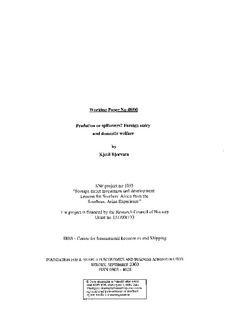| dc.contributor.author | Bjorvatn, Kjetil | |
| dc.date.accessioned | 2006-08-31T07:55:57Z | |
| dc.date.available | 2006-08-31T07:55:57Z | |
| dc.date.issued | 2000-09 | |
| dc.identifier.issn | 0803-4028 | |
| dc.identifier.uri | http://hdl.handle.net/11250/165726 | |
| dc.description.abstract | This paper analyses the effects of foreign entry on domestic welfare. Foreign entry may increase competition in the local market and thereby improve domestic consumer surplus. It may also lead to spillover effects, which benefit both domestic firms and consumers. But foreign entry is also likely to involve some degree of profit shifting, as home country firms lose market shares to the foreign entrant. The profit shifting argument is particularly severe if the foreign entrant acts as a predator, eliminating local firms from the market. The analysis demonstrates that (i) the home country in some cases may be better off if the foreign entrant is a relatively high cost firm; (ii) high (potential) spillovers are not necessarily an advantage to the host country, and; (iii) economic integration, by bringing down trade costs, may make FDI a more attractive option for the host country than trade. | en |
| dc.format.extent | 594439 bytes | |
| dc.format.mimetype | application/pdf | |
| dc.language.iso | eng | en |
| dc.publisher | SNF | en |
| dc.relation.ispartofseries | Working paper | en |
| dc.relation.ispartofseries | 2000:48 | en |
| dc.subject | foreign direct investment | en |
| dc.subject | welfare analysis | en |
| dc.subject | choice of technology | en |
| dc.subject | game theory | en |
| dc.title | Predation or spillovers? : foreign entry and domestic welfare | en |
| dc.type | Working paper | en |
